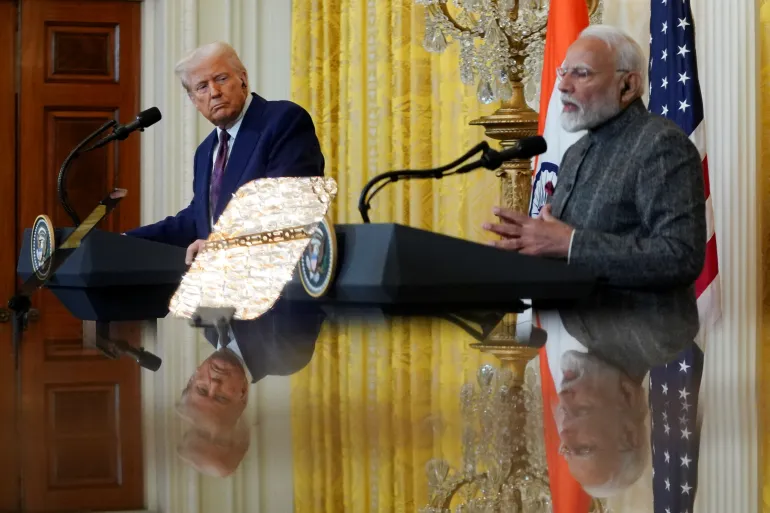In a move that has reignited trade tensions between Washington and New Delhi, U.S. President Donald Trump has announced plans to “substantially” raise tariffs on Indian goods, accusing India of profiting from the resale of Russian oil while ignoring the ongoing war in Ukraine. The escalation marks a sharp turn in U.S.-India relations, which had enjoyed several years of growing cooperation before recent policy rifts began to widen.
Trump’s remarks, delivered via a social media post on Monday, criticized India for what he described as “massive” purchases and re-exports of discounted Russian crude oil. “They don’t care how many people in Ukraine are being killed by the Russian War Machine,” Trump wrote. “Because of this, I will be substantially raising the Tariff paid by India to the USA. Thank you for your attention to this matter!!!”
While the U.S. president did not clarify the timeline or magnitude of the proposed tariff increases, the threat follows a recent 25% tariff hike on Indian imports, which Trump justified by pointing to New Delhi’s continued defense purchases from Moscow and existing trade imbalances. In 2024 alone, the United States imported goods worth $87.4 billion from India, according to official U.S. government data.
India swiftly pushed back against the criticism, calling it “unjustified and unreasonable.” In a formal response, the country’s Ministry of External Affairs emphasized that India’s energy imports from Russia are designed to keep domestic energy prices predictable and affordable amid volatile global markets. “Like any major economy, India will take all necessary measures to safeguard its national interests and economic security,” said ministry spokesperson Randhir Jaiswal.
The diplomatic row has emerged against the backdrop of India’s strategic decision to deepen its energy ties with Russia since the outbreak of the Ukraine war in February 2022. According to the U.S. Energy Information Administration (EIA), India ramped up its purchases of Russian oil more than sixfold following the conflict, taking advantage of deep discounts as Western sanctions severely restricted Moscow’s traditional energy markets. While Europe and the U.S. also continued certain imports of Russian energy early in the war, they have since moved toward stricter sanctions, increasing scrutiny on countries that maintain strong trade relations with Russia.
India, however, has defended its stance by citing energy security and sovereignty. Jaiswal underscored that New Delhi’s foreign policy decisions “should not be seen from the prism of a third country,” and reaffirmed the enduring strength of the India-Russia partnership. “Our bilateral relationships with various countries stand on their own merit,” he said, adding that India and Russia share a “steady and time-tested” strategic relationship.
Trump’s tariff threats come amid a broader recalibration of his administration’s foreign policy in response to the prolonged war in Ukraine. Despite earlier neutrality and promises to mediate peace, Trump has grown increasingly critical of Russia in recent weeks. He has floated new sanctions against Moscow and dispatched White House envoy Steve Witkoff to Russia for high-level talks aimed at de-escalation.
Still, Trump’s recent criticism of India marks a notable shift in tone. On Sunday, White House adviser Stephen Miller intensified the rhetoric, accusing India of “financing” the Russian war effort. Speaking to Fox News, Miller said, “People will be shocked to learn that India is basically tied with China in purchasing Russian oil. That’s an astonishing fact.”
The growing tensions come as countries around the globe grapple with the geopolitical fallout of the Ukraine war and the changing dynamics of global energy markets. India’s balancing act maintaining close ties with the United States while preserving its decades-long partnership with Russia has drawn scrutiny from both Western policymakers and international observers. Yet New Delhi has remained firm in its commitment to pursue an independent foreign policy that prioritizes national interest over external pressure.
As the U.S.-India relationship enters a new phase of strain, questions loom over the potential economic and strategic fallout. The possibility of punitive tariffs from Washington could affect multiple sectors, including pharmaceuticals, textiles, and information technology services, where India plays a vital role in the U.S. economy.
With President Trump’s trade agenda increasingly interwoven with his foreign policy on Ukraine and Russia, the coming weeks may determine whether this latest round of rhetoric evolves into a full-blown trade war or whether diplomacy prevails to preserve what has been one of the most strategically important partnerships in the Indo-Pacific region.
